
Suppose your stall is in the busiest area. Of course, you expect more customers to visit and purchase from your shop.
But it could be easier if you knew approximately how many customers pass by your shops, the number of people who come to you, and especially what they buy from you to market your brand well.
On the digital front, SEO reporting helps you get these numbers. With it, you can determine whether your brand is found quickly and whether your customers like what you sell.
These numbers are enough to carefully tweak your SEO strategies to improve the number of visitors to your website.
If you have already implemented specific strategies, do you know how they perform?
Yes, you definitely should have an SEO report to look at.
Here’s everything they do for you:
- Data collection and analysis can be automated.
- Delivers accurate data and insights.
- Gives detailed reports on each metric.
- Option for customizing the reports based on needs.
- Identifies patterns and trends.
- Continuous monitoring of SEO campaign performance.
- Get insights on competitor’s strategies.
- Presents data in a visual manner for greater comprehension.
- Consistent reporting pattern for clarity.
- Collaboration and sharing features are available to improve strategies.
There are plenty of SEO reporting software designed to give good SEO reports. Let’s find the best SEO reporting tools in the market while considering some paid and free SEO tools.
Free SEO Tools
Automating data analysis can save time and increase confidence. Use these user-friendly free SEO tools to get data in a centralized location and make wise decisions.
1. Google Search Console
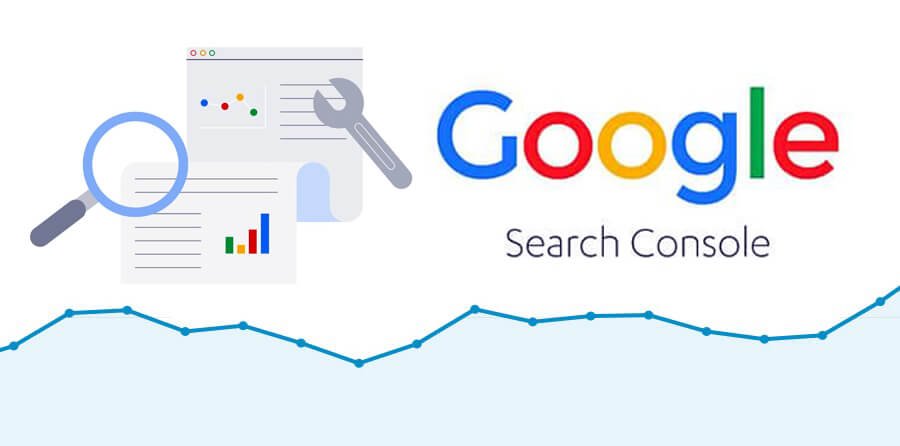
The most widely preferred tool tracks the site’s search performance and health metrics. There is tons of data to explore, but the unique distinguishing factor is direct integration with Google search data.
The features of Google Search Console include:
- Comprehensive and accurate information on your website’s search performance data.
- Analytics of average position, search queries, and click-through rates to gain insight into your website’s visibility on Google.
- Understanding the site’s search traffic, crawl errors and issues, and ranking data.
- Reliable for organic search performance as it can identify the website’s visibility issues in the search.
- Highly accurate in providing insights on impressions, CTR, clicks, and average position.
The drawbacks are:
- Google Search Console’s reliability instills confidence in the data you’re working with, ensuring that you can make decisions based on accurate information.
- However, it might be difficult for beginners to navigate because of a challenging learning curve.
- The visualization and free SEO report are basic compared to other advanced SEO reporting tools.
- Long-term trend analysis is limited as it only holds data for up to 16 months.
Subscription: Free
2. Google Analytics

The popular free SEO tool is Google Analytics, which tracks user behavior and analyzes website traffic.
The features of Google Analytics include:
- The user metrics are oriented toward tracking page views, bounce rates, conversation rates, and sessions.
- Through acquisition channels, user interaction flow, and demographics, you can gain insights into user behavior, even on a granular level.
- With various traffic sources involved, Google Analytics can determine how your visitors discover you.
- It also helps you identify the popular user paths on your website, showing the user journey in a visual representation and identifying any drop-off points.
With Google Analytics, the user experience can be improved.
The drawbacks are:
- With many features, it can seem overwhelming to a first-timer, though it has excellent capabilities.
- Like the Google search console, it has limited data retention, hindering long-term analysis with only up to 14 months of data.
- As the data grows, data sampling may reduce the accuracy of the analysis. Though it has free SEO report customization capabilities, its advanced reporting requires external tools and technical know-how on integrations.
Subscription: Free
3. AnswerThePublic

Another excellent SEO tool that is free and valuable during the ideation phase is helping you cater to the audience, specifically with keyword research and content planning.
The features of AnswerThePublic include:
- AnswerThePublic approaches keyword research a bit differently by giving you a visual representation of the individual question-based queries and phrases about any topic.
- Moreover, the insights are such that they come raw from your user’s search query, giving you the exact depiction of their search, including the language.
- In most tools, long-tail keywords are often disregarded, but stressing them can help you rank due to their specificity and low competition.
- You can continue producing timely content as it analyzes the trending topics in your niche, helping you stay relevant to situations.
- With its visual depiction, you can easily spot content opportunities without breaking your brain.
- From Who to Why, comparisons to an alphabetical list give you comprehensive coverage on search queries, allowing you to be at the top of the game consistently.
- The usage of this SEO reporting tool is more oriented towards content planning than performance tracking and user behavior, unlike Google Search Console and Google Analytics, so you can’t expect metrics here.
The drawbacks are:
- The search trends might not be accurate because they rely on Google’s autocomplete suggestions.
- You might even miss the drill-downs in catering, specifically the need for more consideration for geographic segmentation.
- Unlike other free SEO report tools, integrations are not allowed, requiring you to interpret certain analyses manually.
- Sometimes, too many suggestions can be overwhelming when arriving at content planning, as there is no additional filtering.
- Overall, some unique features mentioned here come with a subscription and may not be accessible.
Subscription: Freemium
4. Ubersuggest
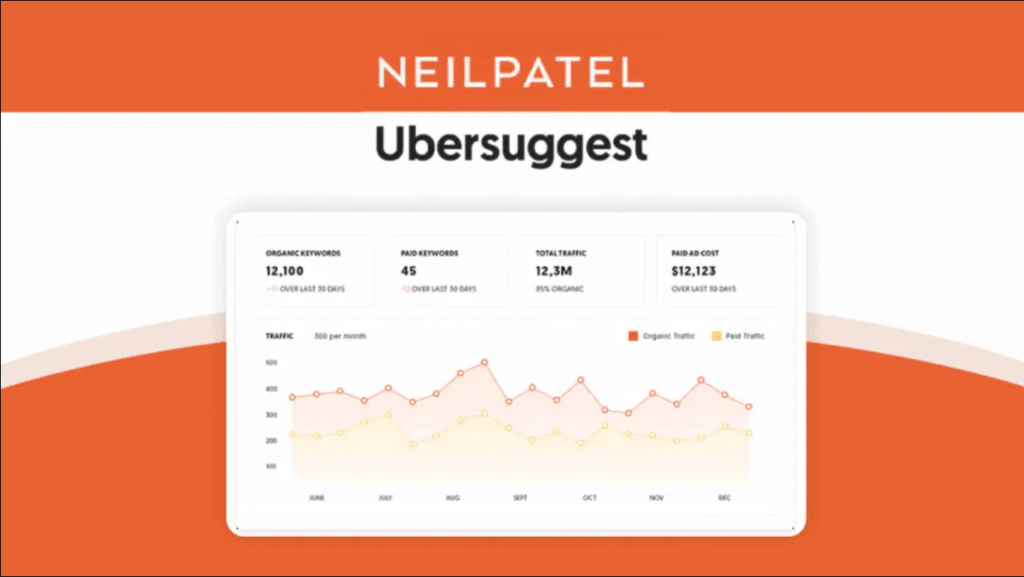
With Ubersuggest’s free SEO reporting tool, you can reverse engineer what your competitors are doing in your space, from SEO to social media strategy, by getting insights on what’s up with them.
- Write specifically rather than randomly based on what people like in your competitor’s strategy with SEO page report visibility so that you use your content ideas wisely rather than guessing.
- The free tool gives you keyword suggestions backed by volume, cost per click, and competition. To make it even more productive, it suggests depending on the searches and the keywords that work for your competitors.
- Get ahead in your backlink game by seeing what keywords are backlinked and easily asking for backlinks from these sites for your websites.
- Understand the backlink quality, including a site’s backlink count and the domain to which it is linked.
- You are sorted from learning about the content’s social shares to the keyword’s performance in one place.
- Get a customized or simplified dashboard that allows you to take action.
The drawbacks are:
- If you need real-time data insights, it might hit a setback.
- Notably, the accuracy of the metrics could be higher than that of other big tools in the market.
- With its simplistic reporting feature, advanced users may not get detailed data when needed.
Subscription: Freemium
5. SEOquake

The free on-the-go SEO extension performs rapid browser analysis, predominantly using SEMrush data.
The features of SEOquake include:
- Unlike other extensions, this gives you the majority of the data metrics essential to getting a hold of your SEO strategy as you begin.
- It also gives you suggestions for on-page SEO improvement with a site audit.
- The SEO bar provides an overview of the website, whereas the SEO dashboard provides a detailed analysis.
- The keyword analysis is based on prominence and frequency.
- It can simultaneously compare up to 15 URLs and export the analysis to a CSV file.
The drawbacks are:
- With too much data and a lack of tutorial guides, it can become overwhelming for users.
- It offers data, but at times, it might lose the precision expected.
- It is adaptable on multiple platforms, but as it works in the browser, your browser may become slow when you are dealing with large datasets.
Subscription: Free
Also read: Best Free Content Writing Tools
Paid SEO Tools
If everything could work for free, then what’s that business model? Some tools come with the freemium model, which only offers certain complimentary features, and you need to pay for more extended features. At the same time, some come entirely free as there is something else sorted for them to overthink about giving the functional platform capabilities for free. Also, there are a few that are phenomenal with paid models. Let’s look at some of the best SEO reporting tools for you.
1. Ahrefs
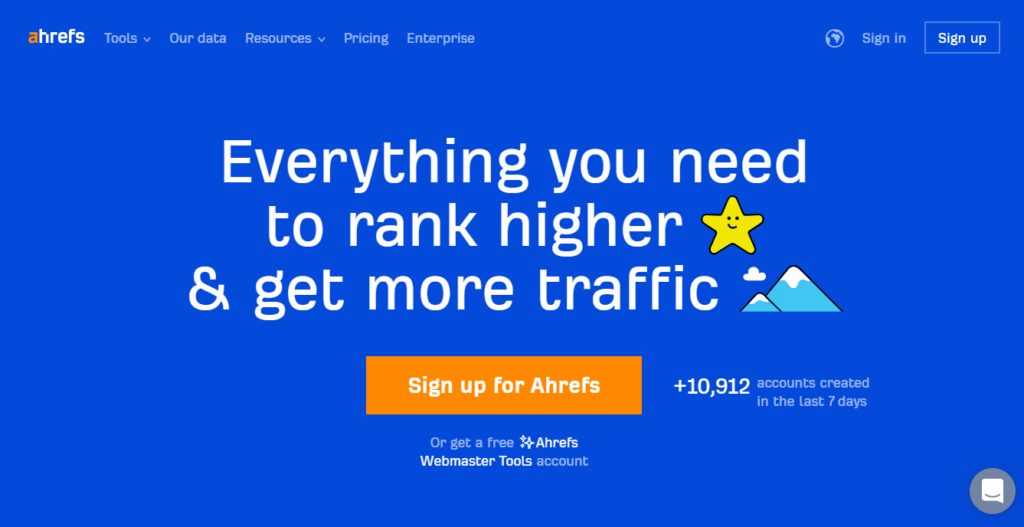
Ahrefs is the best-paid SEO reporting tool. It is known for its powerful SEO capabilities and strongly advocates backlink analysis.
The features of Ahrefs include:
- With a vast database of indexes, it has around 12 trillion known links to make such an excellent analysis.
- The site explorer features allow you to find the backlink profile and the organic search traffic for any website.
- It is known for its keyword research tool and provides in-depth metrics associated with keyword research.
- The content explorer, on the other hand, gives you suggestions on content ideas for any topic based on the backlinks and social media shares.
- The site audit offers insights on fixing the site issues that might hinder the ranking.
- Besides, you can track the performance of your SEO and content strategy with its detailed reports, which give you visibility into keyword ranking, organic traffic, site health, or any other customizations that you’d like to add to them.
If the tool’s crawler can crawl about 6 billion websites in half an hour, imagine how updated its index could be to help you with the backlinking strategy.
The drawbacks are:
- There are many free tools in Ahrefs, but there aren’t any free trials for paid tools.
- Every plan comes with one user seat, and additional seats are expensive.
- Its interface is quite sluggish.
Subscription: There are three plans: the basic starts with the Lite, which starts at $99 per month; the second is the advance plan, priced at $399 per month; and the last is the Enterprise plan, which starts at $999 per month.
2. Semrush

Another highly talked about paid SEO reporting software, SEMrush, is also widely used by most. It’s an all-in-one tool like Ahref, with mostly everything related to SEO but a strong focus on position tracking and keyword research.
- What makes them stay ahead is their uniqueness in position tracking, which includes various reports, including device and location reports, competitor discovery reports with unlimited tracking, project merge reports, and also a SERP feature called “Filter.”
- You get to integrate it effortlessly with the Google Search Console.
- It aids in disavowing the harmful links in a matter of clicks by identifying them.
- The SEO reporting tool’s customizations are flawless. You can club reports from different tools, like SEMrush or Google integrations, and customize them to everything you want to track.
- Do a local or global keyword search without having to look anywhere else.
- With everything else included, it covers aspects of SEO, content, social media, PPC, and competitor research.
The drawbacks are:
- This gives data from the Google search engine alone and not any other.
- By default, all the plans come for one user alone and adding more seats costs extra, which is expensive.
- There is a limitation on the number of projects you can concurrently run.
- Using SEMrush in a mobile app is meant for something other than that.
Subscription: The pro plan starts at $119.95 per month and goes up to $449.95 per month for a business plan.
3. Moz Pro
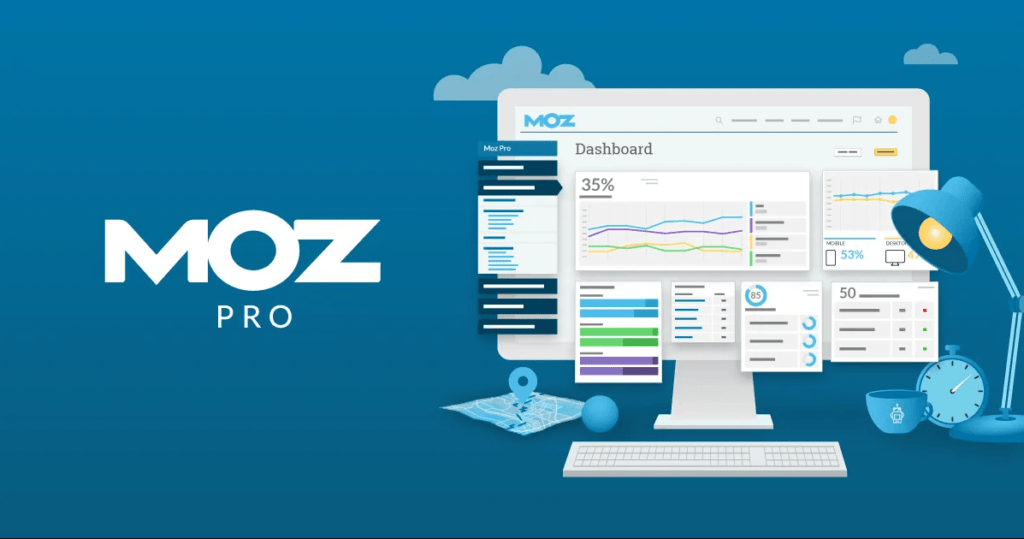
Moz was also known as SEOmoz for some time but is now popularly heard as Moz. Its tool focuses on visibility and search engine ranking predominantly and has other excellent abilities to show, just like the other paid best SEO reporting tools that you read above.
The features of Moz Pro:
- With its keyword explorer, you can find new keyword opportunities for building strategies and conducting site audits to identify the crawl issues on your website.
- Your implementations can be monitored with rank tracking, and you have a backlink analyzer for finding lost or new backlink opportunities.
- The distinctive feature is the on-page optimizer, which helps you optimize specific pages based on target keywords.
- Having been affiliated with more than 1 billion marketers and SEO agencies, it has gained popularity amongst other paid tools. It provides comprehensive SEO reports that you look forward to.
The drawbacks are:
- Too much data is intimidating, although there are numerous tutorials to help.
- The interface could be more user-friendly.
- The critical feature comes with an additional price for higher plans.
Subscription: The standard plan starts at $99 per month, the large plan at $299 per month, and the premium plan at $599 per month.
4. SERPWatcher
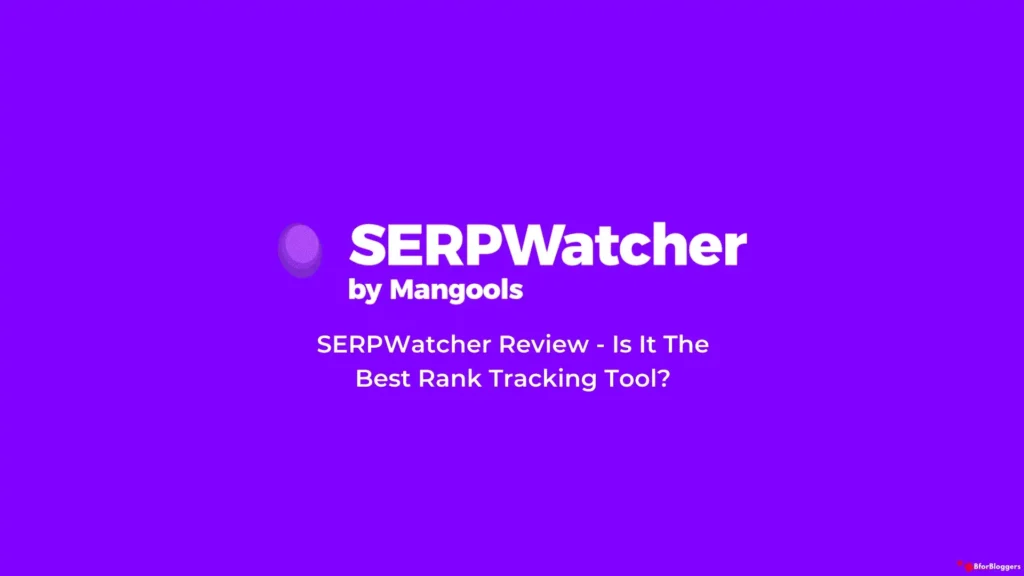
The tool tracks your website’s rank regularly on the SERP, thus helping you position well by changing or creating an SEO strategy that works for your site to stay on top.
The features of SERPWatcher include:
- It doesn’t matter whether the results are on mobile or desktop. It can monitor any domain in any of these places.
- It can give you insights into estimated visits, the flow of the keyword positioning and distribution, and the top losing and gaining keywords presented to you.
- The most user-friendly keyword tracker can send you a monthly or weekly report of the keywords you want to track.
- It tracks to an extent where you can get notified when it leaves or enters the top 10 to 100 SERP positions.
- It’s smart to find out whether the given term automatically has a snippet feature in the SERP, which helps you determine whether your website is part of that ranking.
- With the performance and dominance index, you can know how dominant you are organically and your performance status at a glance.
- Its plan allows you to track almost unlimited domains.
- The shareable reports are such that you can share them with any team member or individual.
- Also, it can integrate with other tools for deeper analysis.
The drawbacks are:
- The keyword tracking for mobile and desktop is done separately, thus charging you extra credits to track keywords.
- The maximum tracking limit is only 1500 keywords with SERPwatcher.
- The traffic estimate is not 100% accurate.
Subscription: It’s a Magnools tool. The Magnools Entry plan starts at $29 per month, followed by the Magnools Premium plan, which is $69 per month, and the Magnools Agency plan, which starts at $129 per month.
5. Screaming Frog
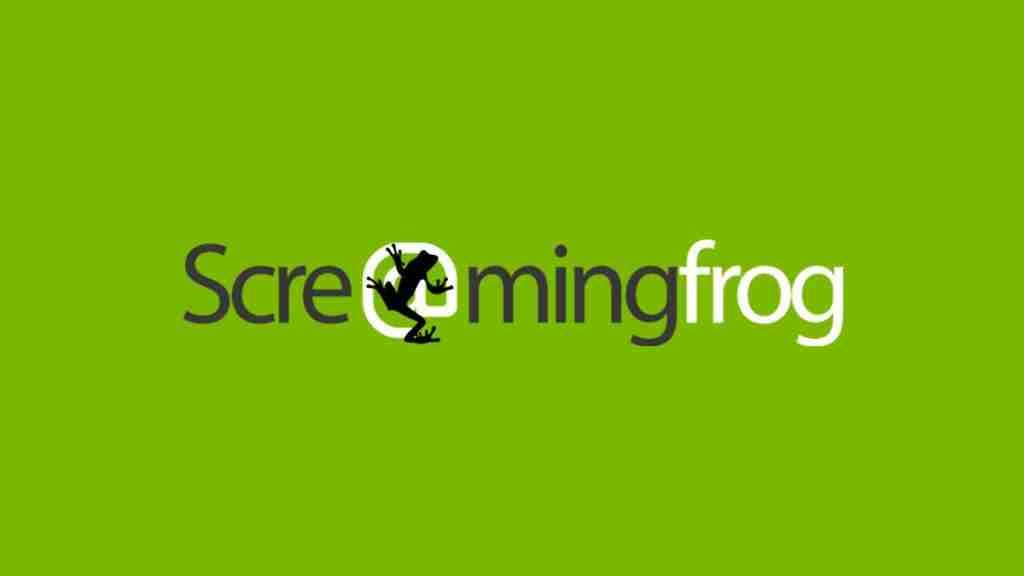
It’s a website crawler built to do site audits to resolve technical SEO issues.
The features of Screaming Frog include:
- Screaming Frog’s strength is its ability to figure out the wide range of issues with SEO.
- You can find details on how the on-page elements perform and whether they meet SEO best practices.
- It can also be integrated with Google Search Console, PageSpeed Insights, and Google Analytics to understand site performance fully.
- It can also be used for custom extraction, giving users flexibility in doing numerous SEO tasks.
The drawbacks are:
- While it does a great job, the technical nature of the data can overwhelm a non-SEO-practicing professional.
- It can crawl over 500 URLs using a paid version, and all the additional features come at a higher price.
Subscription: The freemium and paid plans cost £199 per year. Plans vary based on the number of bulk user licenses purchased at the time.
SEO Reporting Softwares
Plenty of SEO tools offer SEO reporting software capabilities while also analyzing certain or all aspects of SEO. However, a few specific SEO reporting software programs are designed to pull out content from every tool you use to follow SEO practices.
It brings data into a visually excellent and comprehensive dashboard, allowing you to see all the critical data in one place. It makes your decision-making ability even faster as it avoids visiting multiple tools for specific things.
Let’s look out for the best SEO reporting software.
1. AgencyAnalytics

The most dedicated and automated SEO reporting software that doesn’t miss a beat in keeping a tab on the performance of your strategies.
The features of AgencyAnalytics include:
- Using a drag-and-drop dashboard, you can create custom reports on AgencyAnalytics.
- It fetches data from integrations and is connected to various platforms, such as social media, web analytics, ads, and email campaigns.
- With automated reporting abilities, you can schedule the email reports to be sent regularly to the stakeholders.
- It also has white-label options, which allow you to add colors or logos to represent your brand.
- There are various templates available to customize it to your preferences and needs.
The drawbacks are:
- The accuracy of the data representation can be lower.
- It has no GPT functionality at the moment.
Subscription: For a freelancer, the tool costs $79 per month. For an agency, it is $179 per month, and a premier plan has custom pricing.
2. SE Ranking

It’s more like a toolkit for SEO that does everything end to end, including reporting for you.
The features of SE ranking include:
- It’s a complete toolkit for SEO monitoring, including a website audit, a rank tracker, an on-page SEO checker, and a backlink monitor.
- It covers SEO research, including keyword suggestions, a backlink checker, competitive research, and a SERP checker for any site.
- It also has a content marketing tool that populates you with topic suggestions, fastens your content creation process, and optimizes it for best practices with suggestions and scores.
- It can help you improve local search visibility and track progress.
- Its reporting capability is robust, with report scheduling capabilities and white-label features.
- Numerous templates aid in making custom reports.
- The link is enough to share with others and can be downloaded in many formats.
- You can also share the data on a Looker dashboard.
- It also helps as a white-label SEO audit software for agencies.
The drawbacks are:
- There isn’t a keyword gap tool in it.
- There is a limitation to the number of words in the AI writing tool.
- With information-rich tools, it can be overwhelming to comprehend the platform initially.
Subscription: Though an all-in-one platform, you can utilize it for an SEO report generator alone. The essential plan, which is the basic, is $65 per month; the next is the pro plan, which is priced at $119 per month. And the last plan is business, priced at $259 per month.
3. StoryChief

A tool designed to ease the content creation process, analytics, publishing, and collaboration.
The features of StoryChief include:
- It has the power of AI to speed up content creation for articles, campaigns, and social media.
- It optimizes the content for SEO while also giving keyword suggestions.
- With just a dashboard, you can distribute content across various platforms.
- It has a more excellent collaborative feature that allows for assigning tasks, gives real-time feedback, and manages an editorial calendar to improve productivity.
The drawbacks are:
- You can’t embed custom code in StoryChief.
- You might need help to include a video from the device storage in a blog post.
- You may not be able to schedule the post automatically here.
Subscription: The individual plan starts at $40 per month, the marketing team plan at $60 per month, and the agency plan at $180.
4. Google Data Studio

Google Looker Studio, previously named Google Data Studio. Undoubtedly, it’s a powerful SEO reporting software that lets you create interactive dashboards.
The features of Google Data Studio include:
- These are shareable and integrate with Google Analytics, Google Ads, and Google BigQuery, allowing you to analyze data in real time!
- Businesses must break down a complex data web to better absorb the underlying information. This platform enables the easy creation of charts, tables, and graphs.
- What’s more? It’s customizable and consists of drag-and-drop functionality!
The drawbacks are:
- Although it has so many features, it might be difficult to understand it at first.
- Utilizing all the features is daunting, and there’s a learning curve involved.
- You might face performance issues if the dataset you want to extract in real time needs to be more significant.
- While it’s true that there are built-in customizable features on this platform, it’s less intuitive compared to other SEO reporting tools on the market.
- And lastly, when you’re dealing with learning from critical data, you might find that the more sophisticated analytics capabilities are missing on this platform.
Subscription: Looker Studio operates on a freemium model and offers a free tier for individual users and small teams. The free tier provides access to the core features and even integrates with Google’s ecosystem.
Looker Studio Pro meets the advanced needs, starting at around $9 per user per monthly project. For the enterprise, the pricing ranges from $3,000 to $5,000 per month for the first 10 users. This includes expanded administrative features and support.
Also read: WordPress Plugins For Marketers
The Wrap
The list of SEO reporting software can go on; the ones mentioned in the article are a few of the best SEO reporting tools to consider. All the SEO analysis tools, free or paid, come with basic SEO reports. But you might have to shell out a few bucks for more comprehensive and dedicated SEO reporting software.
- Users with budget constraints can begin with free SEO tools; for extended capabilities, they can shift to a lower-tier plan of Moz Pro.
- If you are focused on content marketing, StoryChief can serve as a helpful tool.
- Ahrefs or SEMrush can be the right tool suggestions for those looking for comprehensive insights, but they are also more expensive.
- If technical SEO is the focus, then you know Screaming Frog is the go-to.
- For dedicated SEO reporting software, you have AgencyAnalytics.
Regardless of your choice, be sure to pick the ones that suit your needs. Sometimes, SEMrush’s all-in-one capability might not be the right choice.
For the current stage of your growth, you can probably manage with Google Analytics and Google Search Console and still work with Ahref’s free tools for keyword research and competitor analysis. The point is to understand your needs and invest in those that make the most sense for your business at the current stage.
Website performance is critical for any business; revise, track, and revise the strategies to keep growing!
